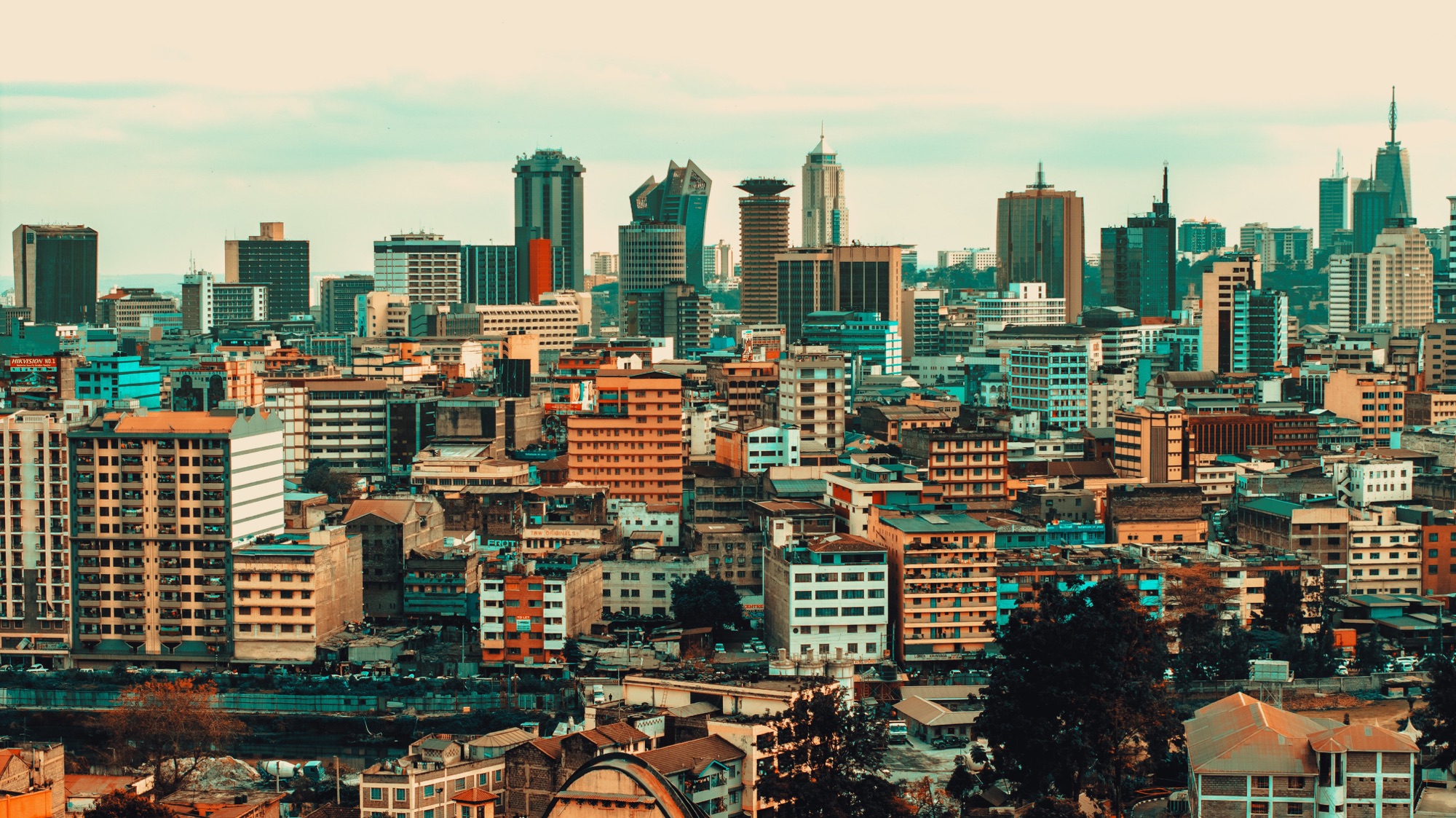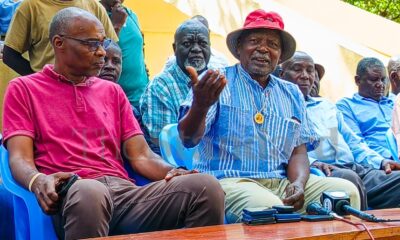Investigations
A Pattern Emerges: How Somali-Led Cartels Are Fueling Kenya’s Real Estate Boom With American Fraud Money
Real estate agents in Nairobi’s upmarket estates—Kilimani, Kileleshwa, Lavington, and even Karen report a surge in cash purchases by Somali-Kenyan buyers over the past five years.

The numbers are staggering, the pattern unmistakable.
As American federal prosecutors work through what has become the largest COVID-19 fraud case in United States history, a disturbing money trail leads directly to Kenya’s booming real estate sector—and the Kenyan authorities are either unwilling or unable to stop it.
Ahmednaji Maalim Aftin Sheikh, a 28-year-old Kenyan national, became the 74th defendant indicted in the sprawling Feeding Our Future fraud case in September 2025.
His alleged crime? Laundering over Sh5.1 billion ($40 million) stolen from American children’s meal programs—money that prosecutors say was systematically funneled into Kenyan real estate, hidden behind shell companies and smuggled in bulk cash.
But Sheikh is not an isolated case.
He is the latest link in a chain of Kenyan nationals—predominantly of Somali descent who have been charged in American courts for their roles in massive international money laundering schemes.
The pattern is too consistent to ignore, and the implications for Kenya’s economy too serious to dismiss.
The Minnesota Connection: Ground Zero for Fraud
Minnesota, home to America’s largest Somali diaspora community, has become the epicenter of what federal authorities describe as systematic exploitation of social welfare programs.
The Feeding Our Future scandal alone involved the theft of nearly $250 million from programs designed to feed vulnerable children during the COVID-19 pandemic.
The scheme was breathtaking in its audacity: fraudsters registered phantom feeding sites, claimed to serve millions of non-existent meals, and collected payments from federal coffers.
Text messages recovered by investigators reveal the casual nature of the conspiracy.
In one exchange, Abdiaziz Farah—Sheikh’s brother, now serving 28 years in federal prison, sent his younger sibling a photograph of $138,000 in cash.
“You are gonna be the richest 25 year old InshaAllah,” Farah texted in July 2021, alongside images of banker’s boxes stuffed with hundreds of thousands of dollars marked as “family support.”
What happened next is where Kenya enters the story.
Follow the Money: From Minneapolis to Nairobi
Court documents paint a detailed picture of how American fraud proceeds were laundered through Kenya’s property market.
Between 2020 and 2022, Sheikh allegedly received millions from his brother, investing the stolen funds in:
- A stake in a Kenyan real estate company
- An upmarket apartment near Nairobi National Park
- Land parcels in Mandera, near the Somali and Ethiopian borders
- Multiple properties registered through shell companies
The Mandera land purchases are particularly revealing.
The region, bordering Somalia, has long been a strategic corridor for cross-border financial flows—both legitimate and otherwise.
By investing in remote border areas while simultaneously acquiring high-end Nairobi properties, the laundering operation achieved both geographical diversification and asset concealment.
Real estate agents in Nairobi’s upmarket estates—Kilimani, Kileleshwa, Lavington, and even Karen report a surge in cash purchases by Somali-Kenyan buyers over the past five years.
Transactions often bypass formal banking channels, with buyers arriving with suitcases of foreign currency, exploiting gaps in Kenya’s anti-money laundering enforcement.
The Gray List Warning: Kenya’s Laundering Haven Status
Kenya’s inclusion on the Financial Action Task Force (FATF) gray list for money laundering deficiencies is no coincidence.
The designation, which places the country under increased monitoring, reflects systemic failures in combating financial crimes.
The real estate sector has become the primary vehicle for money laundering in Kenya.
Unlike bank transfers, which leave digital trails and trigger reporting requirements, property transactions—especially those conducted in cash offer anonymity and legitimacy.
A laundered dollar becomes a concrete apartment; dirty money becomes a title deed.
According to financial crime analysts, Kenya’s property boom in traditionally expensive neighborhoods is being artificially inflated by illicit capital inflows.
Young professionals and middle-class families find themselves priced out of markets where foreign fraud proceeds compete against legitimate local earnings.
Not An Isolated Case: A Disturbing Pattern
Sheikh’s indictment is merely the most recent in a troubling series:
- Multiple Minnesota fraud cases involving Kenyan nationals have emerged since 2020, most connected to COVID-19 relief program exploitation
- Wire fraud charges against Kenyans of Somali descent have increased dramatically in U.S. federal courts
- International money laundering conspiracies repeatedly identify Kenya as the destination jurisdiction for proceeds
The FBI, IRS Criminal Investigations, and U.S. Postal Inspection Service have made investigating these networks a priority. Special Agent in Charge Alvin M. Winston, Sr. was blunt in his assessment: “The suspect saw this instead as an opportunity to steal from taxpayers and from hungry children.”
Yet despite the mounting evidence and international cooperation between American and Kenyan law enforcement, prosecutions in Kenya remain virtually non-existent.
The Questions Kenyan Authorities Must Answer
Why has there been no parallel investigation in Kenya? If Sheikh and others laundered tens of millions through Kenyan real estate, where are the local prosecutions for money laundering? Why haven’t the shell companies been identified and dismantled?
The answers point to institutional failure—or worse, institutional complicity. Kenya’s anti-money laundering framework exists on paper but remains toothless in practice.
The Asset Recovery Agency, the Financial Reporting Centre, and the Ethics and Anti-Corruption Commission have the mandate and legal authority to investigate these networks. Their silence is deafening.
Consider the audacity: Sheikh entered the U.S. diversity visa lottery in November 2024—after his brother had already been arrested, charged, and convicted of more than 20 federal crimes.
He even married his brother’s sister-in-law in Nairobi in December 2021, with her later attempting to sponsor his U.S. residency. This suggests a stunning confidence that Kenyan authorities posed no threat to the operation.
The Somali Cartel Question: Ethnicity or Criminal Network?
Investigating this pattern requires confronting an uncomfortable truth: the overwhelming majority of defendants in these American fraud cases share Somali-Kenyan ethnicity.
Is this a coincidence, or evidence of organized criminal networks exploiting diaspora connections?
The facts suggest the latter. These are not isolated opportunists but coordinated operations:
- Family networks spanning continents facilitate fund transfers
- Shell companies registered in Kenya receive and disguise proceeds
- Bulk cash smuggling operations move physical currency across borders
- Real estate investments convert illicit funds into tangible assets
The ethnic dimension cannot be dismissed as irrelevant, nor should it be weaponized for discrimination.
What investigators are uncovering is not a racial conspiracy but a criminal methodology that exploits diaspora trust networks, kinship ties, and cross-border mobility.
Somali business networks have legitimate economic power in Kenya and across East Africa.
But when criminal elements infiltrate these networks using the same channels that facilitate lawful hawala remittances and trade finance, the entire community suffers reputational damage.
The Broader Implications: Kenya’s Sovereignty at Risk
The consequences extend beyond inflated property prices. When foreign criminal proceeds distort local markets, ordinary Kenyans pay the price:
- Housing affordability crisis: Middle-class families cannot compete with laundered millions
- Economic distortion: Legitimate businesses face unfair competition from crime-funded enterprises
- Governance erosion: Illicit wealth buys political influence and protection
- International reputation: Kenya becomes known as a laundering haven, deterring legitimate foreign investment
Perhaps most troubling is the sovereignty question. When American federal agencies must pursue financial crimes that Kenyan authorities ignore, who really controls Kenya’s financial system?
What Must Be Done
The path forward requires political will, not additional legislation:
- Immediate asset freezes on properties identified in U.S. court documents as laundering vehicles
- Parallel prosecutions in Kenya for all individuals named in American indictments
- Beneficial ownership registries requiring public disclosure of property ownership chains
- Cash transaction limits in real estate, with mandatory bank channels for large purchases
- International cooperation including asset sharing agreements with U.S. authorities
Kenya’s Director of Public Prosecutions, Asset Recovery Agency, and Financial Reporting Centre must treat these cases with the urgency they deserve.
The evidence is already compiled and American prosecutors have done the investigative heavy lifting. Kenyan authorities need only act.
Conclusion: The Conspiracy in Plain Sight
Is there a Somali-led cartel systematically laundering American fraud proceeds through Kenya’s real estate market?
The evidence increasingly suggests yes—not as xenophobic speculation, but as documented criminal enterprise.
Seventy-four defendants indicted in a single case. Billions stolen from programs meant to feed hungry children.
Text messages showing casual exchanges of hundreds of thousands in cash. Properties purchased through shell companies across Kenya. And throughout it all, a conspicuous pattern: Kenyan nationals of Somali descent facilitating the flow of American fraud money into East African assets.
The conspiracy is not hidden. It is documented in court filings, investigated by federal agencies, and playing out in Kenya’s property market. The only question remaining is whether Kenyan authorities will finally confront what the rest of the world can already see.
The tears of American children robbed of meal programs and the frustration of Kenyan families priced out of housing are connected by a single thread: criminal greed enabled by institutional indifference.
It is time for that indifference to end.
[Note: This investigation is based on public court documents, law enforcement statements, and documented property market trends. Individuals named are identified from official U.S. Department of Justice indictments and remain innocent until proven guilty.]
Kenya Insights allows guest blogging, if you want to be published on Kenya’s most authoritative and accurate blog, have an expose, news TIPS, story angles, human interest stories, drop us an email on [email protected] or via Telegram
-

 Business2 weeks ago
Business2 weeks agobetPawa Empire Crumbles: Mr Eazi’s Betting Gambit Unravels Amid Partner’s Shadowy Deals
-

 Business1 week ago
Business1 week agoMinnesota Fraud, Rice Saga, Medical Equipment Deal: Why BBS Mall Owner Abdiweli Hassan is Becoming The Face of Controversial Somali Businessman in Nairobi
-

 News1 week ago
News1 week agoDCI Probes Meridian Equator Hospital After Botched Procedure That Killed a Lawyer
-

 Politics1 week ago
Politics1 week agoYour Excellency! How Ida’s New Job Title From Ruto’s Envoy Job Is Likely to Impact Luo Politics Post Raila
-

 Investigations2 weeks ago
Investigations2 weeks agoEXPOSED: SHA Officials Approve Higher Payments for Family, Friends as Poor Patients Pay Out of Pocket
-

 News1 week ago
News1 week agoKenya Stares At Health Catastrophe As US Abandons WHO, Threatens Billions In Disease Fighting Programmes
-

 Politics2 weeks ago
Politics2 weeks agoJaramogi Clan Tells Raila Jr, Winnie Against Disrespecting Their Uncle Oburu, Warns of Curses
-

 Business2 weeks ago
Business2 weeks agoKRA Boss Humphrey Watanga In Big Trouble In Sh5.5 Billion Rice Import Scandal
















